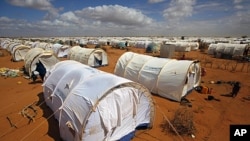The United States is deeply concerned by the humanitarian emergency in the Horn of Africa, the famine that is underway in parts of Somalia, and the escalating refugee crisis across the region. "What is happening in the Horn of Africa is the most severe humanitarian emergency in the world today, and the worst that East Africa has seen in several decades," said Secretary of State Hillary Clinton on August 11 at the International Food Policy Research Institute.
"The United States and our partners in the region, including the World Food Program, the UN High Commissioner for Refugees, UNICEF, NGOs, and donor governments, are racing to save as many lives as possible."
East Africa is in the midst of the worst drought in the last 60 years, and as a result, the United Nations has declared that famine now affects five areas in Somalia and will probably expand throughout southern Somalia.
In hopes of escaping the ensuing famine, tens of thousands of Somalis are leaving their parched homeland and seeking refuge in Kenya, Ethiopia, and Djibouti, straining the capacity of these countries, which are also suffering from drought. Today, more than 12 million people in Ethiopia, Kenya, Djibouti, and Somalia are in urgent need of humanitarian assistance.
With Secretary Clinton’s August 11 announcement of an additional $17 million in humanitarian aid for the Horn of Africa, the United States government is now providing approximately $580 million to the region to meet ongoing and urgent humanitarian needs.
"Right now, when the effects of food security are the most extreme, we must re-dedicate ourselves to breaking this cycle of food shortages, suffering, and dislocation that we see playing out once again in the Horn of Africa. We must support countries working to achieve food security," said Secretary Clinton.
"This is a problem that we can solve. . . . We do have the know-how. We have the tools. We have the resources. And increasingly, we have the will to make chronic food shortages and under-nutrition a memory for the millions worldwide who are now vulnerable."
More U.S. Help For Horn Of Africa

"What is happening in the Horn of Africa is the most severe humanitarian emergency in the world today."



